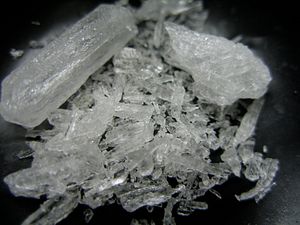Chinese authorities made sure they got a head start on China’s war against drugs in 2014. Liz Carter of Tea Leaf Nation describes Sunday’s massive raid of tiny Boshe village, which officials had dubbed “Guangdong’s No. 1 Drug Village.” The raid, which involved over 3,000 police, resulted in 182 arrests and the seizure of nearly three tons of crystal meth. Though Boshe has only 14,000 residents, the village has produced more than one-third of China’s meth since 2010. China Daily’s report on the operation said that the operation was purposefully carried out by police officers from other areas, because local police forces were suspected of protecting the drug producers. Villagers offered some violent resistance: three police officers were injured during the raid, with two being shot and one being hit by a car. The raid is the most spectacular example so far of “Operation Thunder,” Guangdong’s on-going anti-drug trafficking campaign.
In other (more prosaic) news, according to Xinhua, China’s National Audit Office released a statement Monday revealing that China’s total government debt was 20.7 trillion RMB ($3.4 trillion) as of June 2013. Of that, the central government’s debt was 9.81 trillion RMB ($1.6 trillion) and local governments accounted for the remaining 10.89 trillion RMB ($1.8 trillion). The article notes that the last time the Chinese government released the figures was in 2011, when total government debt at the end of 2010 was reported to be 10.7 trillion RMB.
Financial Times reports on Chinese leaders’ specific plans for dealing with local debt — the government will allow the issuing of bonds to roll over debt, thus allowing local governments to avoid default. The announcement by the National Development and Reform Commission was called “the most explicit official endorsement of a massive debt refinancing operation that has become unavoidable.” Shuang Ding, an economist at Citi, told Financial Times that issuing bonds was a positive step, since they are more transparent than loans and help spread risk.
The New York Times’ Sinosphere blog covers the bizarre incident of a Chinese man whose hot air balloon crashed into the East China Sea while en route to the disputed Diaoyu/Senkaku Islands. The accident provided a rare example of Taiwan-Japan-China cooperation in the area. Taiwanese rescue authorities notified the Japanese Coast Guard of the accident. A Japanese helicopter then rescued the balloonist from the ocean and turned him over to a Chinese patrol boat. J. Michael Cole also wrote about the incident for The Diplomat, noting that the “three sometimes belligerents can set disputes aside and cooperate when necessary.”
Still, that bit of cooperation was paired with China’s Ambassador to the UK writing an editorial in The Telegraph comparing Japan to Voldemort, the villain of the famous Harry Potter book series. The opinion piece, inspired by Shinzo Abe’s recent visit to the Yasukuni shrine, emphasized China and Britain’s common history as allies in World War II and thus both victims of Japan’s militaristic past.
As further evidence of China’s concern over Japan, Xinhua named “Abe’s right-wing politics” as number 2 on its list of the “top 10 world news events in 2013.” Other events in the top five: “new prospects” in China’s diplomacy with countries around the world, the NSA surveillance scandal, the breakthrough over Syria’s chemical weapons, and the terrorist attack in a shopping mall in Nairobi, Kenya.
Meanwhile, Xinhua’s list of the top 10 domestic events in 2013 included the obvious (the leadership transition, the Bo Xilai trial, and China’s establishment of an ADIZ for example) as well as China’s new milestones in space exploration, the State Council’s new Air Pollution Prevention and Control Action Plan, and the deaths caused by industrial accidents in Dehui City and Qingdao.
Finally, in a follow-up to my earlier post on smoking and the tobacco industry in China, experts expect that the Chinese government will not follow a United Kingdom study’s suggestion to triple the tobacco tax. South China Morning Post reports that the pressure from the state-run tobacco industry would almost certainly prevent such a move — even though studies suggest that raising the cigarette tax would not decrease overall tax income and would reduce the number of smokers.

































